Losing Our Religion
America's Protestants are dying off and being replaced by non-believers.
America’s Protestants are dying off and being replaced by non-believers.
NYT (“Number of Protestant Americans Is in Steep Decline, Study Finds“):
For the first time since researchers began tracking the religious identity of Americans, fewer than half said they were Protestants, a steep decline from 40 years ago when Protestant churches claimed the loyalty of more than two-thirds of the population.
A new study released on Tuesday by the Pew Forum on Religion and Public Life found that it was not just liberal mainline Protestants, like Methodists or Episcopalians, who abandoned their faith, but also more conservative evangelical and “born again” Protestants. The losses were among white Protestants, but not among black or minority Protestants, the study found, based on surveys conducted during the summer.
When they leave, instead of switching churches, they join the growing ranks who do not identify with any religion. Nearly one in five Americans say they are atheist, agnostic or “nothing in particular.”
Now, the NYT headline overstates things a bit.
First off, it’s not clear that the number of Protestants is in decline, steep or otherwise. What’s in decline is the percentage of Americans who tell pollsters they’re Protestant. That’s a very different thing.
Second, the decline isn’t particularly steep. Even disregarding sampling error, the decline is pretty small: 53% in 2007, 52% in 2008, 51% in 2009, 51% in 2010, 50% in 2011, and 48% in 2012. That’s a rather gradual decline.
The US population in 2007 was 302.2 million. It’s now 314.5 million. Doing the math, then, we’ve gone from 160 million self-identified Protestants to 151 million.
Here are the year-by-year numbers for the past six surveys:
The longer term trend, going back four decades, is more revealing:
Three things stand out here. First, the 11 point drop in Protestant identification. Second, the fact that Catholic identification has remained essentially constant despite a massive rise in the percentage of Americans of Hispanic origin. Third, the near tripling of those who report no religious belief at all.
Here’s Pew’s analysis of the latter:
One important factor behind the growth of the religiously unaffiliated is generational replacement, the gradual supplanting of older generations by newer ones. Among the youngest Millennials (those ages 18-22, who were minors in 2007 and thus not eligible to be interviewed in Pew Research Center surveys conducted that year), fully one-third (34%) are religiously unaffiliated, compared with about one-in-ten members of the Silent Generation (9%) and one-in-twenty members of the World War II-era Greatest Generation (5%). Older Millennials (ages 23-30) also are substantially less likely than prior generations to be religiously affiliated.
But generational replacement is not the only factor at play. Generation Xers and Baby Boomers also have become more religiously unaffiliated in recent years. In 2012, 21% of Gen Xers and 15% of Baby Boomers describe themselves as religiously unaffiliated, up slightly (but by statistically significant margins) from 18% and 12%, respectively, since 2007. The trend lines for earlier generations are essentially flat. Not only are young adults less likely to be affiliated than their elders, but the GSS shows that the percentage of Americans who were raised without an affiliation has been rising gradually, from about 3% in the early 1970s to about 8% in the past decade. However, the overwhelming majority of the “nones” were brought up in a religious tradition. The new Pew Research Center/Religion & Ethics NewsWeekly survey finds that about three-quarters of unaffiliated adults were raised with some affiliation (74%).
Yet another chart:
What’s impossible to say here is how much of this decline in religiosity is real and how much is decreased stigma in being unaffiliated. My strong hunch is that much of it’s the latter. People who have no religious belief no longer have a social push to lie to pollsters about it.
Part of the reason that the ranks of the unaffiliated have grown in recent years is that Americans who are not particularly religious – at least by conventional measures, such as self-reported rates of attendance at religious services – increasingly describe themselves as atheist, agnostic or “nothing in particular.”
In 2007, 38% of people who said they seldom or never attend religious services described themselves as religiously unaffiliated. In 2012, 49% of infrequent attenders eschew any religious affiliation. By comparison, the percentage describing themselves as unaffiliated has been flat among those who attend religious services once a week or more often.
But there’s some real change here, too. The Republican primary electorate notwithstanding, we’re gradually becoming more European–throwing off our traditional, faith based culture for a more secular one. Most likely, that’s a function of urbanization.
The continued growth of the religiously unaffiliated is one of several indicators suggesting that the U.S. public gradually may be growing less religious. To be sure, the United States remains a highly religious country – particularly by comparison with other advanced industrial democracies – and some measures of religious commitment in America have held remarkably steady over the years. The number of Americans who currently say religion is very important in their lives (58%), for instance, is little changed since 2007 (61%) and is far higher than in Britain (17%), France (13%), Germany (21%) or Spain (22%).8 And over the longer term, Pew Research surveys find no change in the percentage of Americans who say that prayer is an important part of their daily life; it is 76% in 2012, the same as it was 25 years ago, in 1987.
But on some other key measures, there is evidence of a gradual decline in religious commitment. In 2003, for instance, 25% of U.S. adults indicated they seldom or never attend religious services. By 2012, that number had ticked up 4 points, to 29%.
Similarly, the percentage of Americans who say they never doubt the existence of God has fallen modestly but noticeably over the past 25 years. In 1987, 88% of adults said they never doubt the existence of God. As of 2012, this figure was down 8 percentage points to 80%.
In addition, the percentage of Americans who say the Bible should be taken literally has fallen in Gallup polls from an average of about 38% of the public in the late 1970s and early 1980s to an average of 31% since.9 And based on analysis of GSS data, Mark Chaves of Duke University has found that Americans born in recent decades are much less likely than their elders to report having attended religious services weekly at age 12. Young adults are also less likely than older adults to report that when they were growing up, their parents attended religious services regularly.
The demography here shouldn’t surprise anyone: the more education a person has, the less likely they are to be religious–although not by as much as one might guess. Similarly, the South and Midwest remain much more religious than the coasts.
Protestant, Southern evangelicals have of course seen this all coming for decades. Jerry Falwell was talking about this in the late 1970s; it was the rationale behind the Moral Majority. It’s why Southern Baptist preachers warn teenagers about to go off to college to be on their guard lest their liberal professors corrupt them.
The trendlines aren’t good for their worldview. The most religious cohort was born between 1913 and 1927, followed by the cohort born between 1928 and 1945. The youngest of that cohort will turn 67 before the year is out.
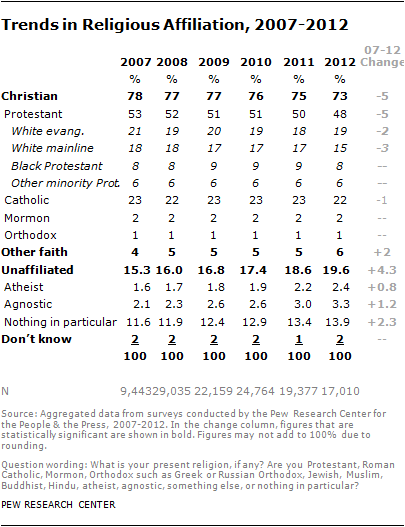
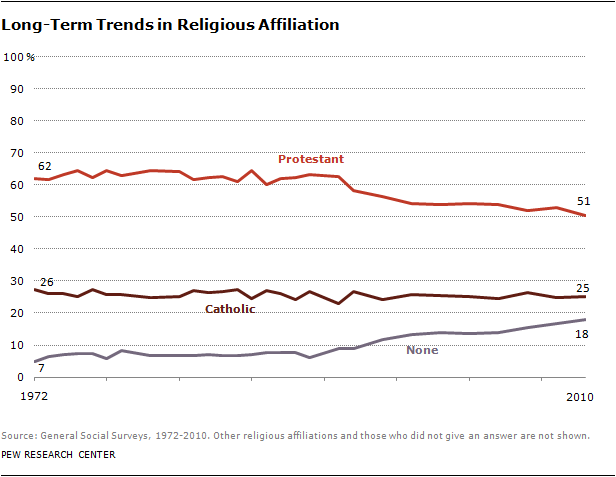
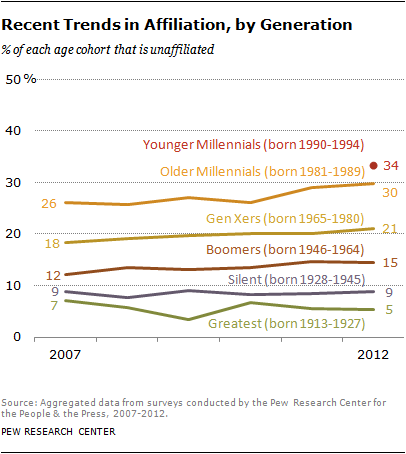
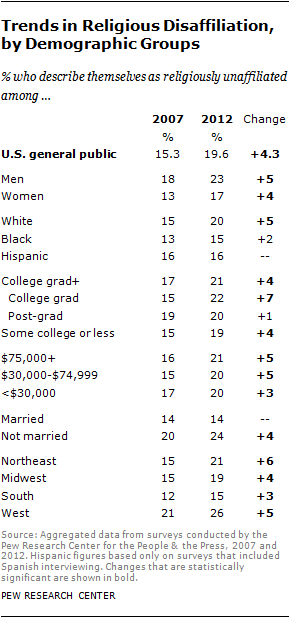

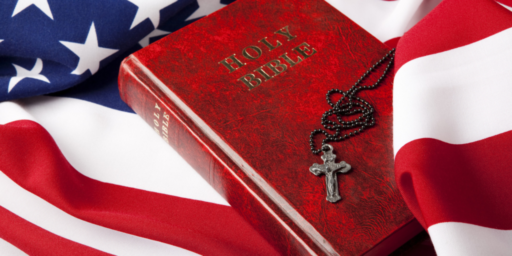



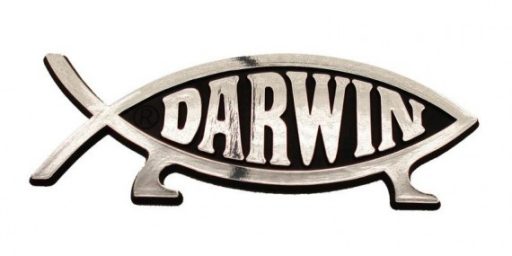
This definitely is the trend. It’s unmistakable. Irrefutable. So long as the state and especially dependence thereon doesn’t become a substitute then we’ll probably be a lot better off as a result.
Considering that The Enlightenment was probably responsible for the greatest benefit to Mankind that has come down the pipeline since the invention of agriculture, I’ll stick on the rational/logic side of the spectrum, thank you very much. Maybe it’s because enough of us have gotten ticked off by the in-your-face religiosity of people running around calling themselves “religious.” As far as I can tell, “God” is used by far too many people as nothing more than an Instant Authority Figure they invoke to justify doing whatever they feel like at the time.
I agree. I remember living in Munich in the late 60s and early 70s and one of the things that amazed me was very few people attended church. On the surface Munich and Bavaria were very Catholic – crucificts everywhere – but the churches were empty on Sunday morning. I live in a 55+ community and of the 20 houses around me there is only one person that goes to church.
Hmmm…
As a “confirmed” atheist, I wholly support this trend.
While some may argue that religion allows for a “moral” frramework, history shows different.
I am always amused when absolutely sane individuals suddenly lose it completely and worship an invisible sky pal., and then request and justify actions based on ghostly unseen intervention.
Y’all are crazy.
/not trollin. just continuously baffled.
Now worries, it will take a couple generations but I’ve already seen some of the trend. See, the non-religious want to be able to appeal to Christian morality to support their demands for growing welfare. But without religious teachings, there is no moral obligation to provide support for others. Individually some may have empathy but collectively there is no obligation, beyond the government’s gun.
So as with infrastructure and big dams, the younger are living off the Christian teachings of their betters without replenishing the well. But as the Millennials demonstrate, the teachings are organic and must be inculcated in childhood. Look for increasing coarse civil society and increasing oppressive state actions to enforce the moral codes that were once created by changing hearts instead of apply truncheons to heads.
@JKB:
Yeah, that’s when they’re most vulnerable. You have to indoctrinate them before they’re mature enough to figure out it’s all bullshit.
@Ron Beasley:
My wife is from Bavaria (Nuremberg, which is kind of an island of Lutheranism, actually). She’s the youngest of four children, all of whom have children of their own. Nobody in her extended family goes to church unless someone’s getting married or buried, and even then it’s more from tradition than actual belief.
@JKB: No, sorry, you lose. It is quite possible to develop a purely rational and self-reinforcing set of ethics without believing in a deity or deities. Anyone who confuses ethics with religion should be forced to read Marcus Aurelius and Seneca in the original.
@JKB:
In what way does this even start to make sense?
I suspect it’s partly just labelling. More people noawadays feel comfortable putting the “non-believer” label on themselves.
I think of my father. The man has mocked religion for as long as I can remember. But if asked, he’d say he was a protestant. Heck, he won bible knowledge competitions as a kid. He was what I’d call culturally protestant (and proud of it/disdainful of Catholicism), but didn’t actually, you know, Believe.
Take that same person, shift him forward in time such that he’s born in the 70s instead of the 20s, and he probably self-identifies as unaffiliated. Same person, same belief/lack of belief, different labelling.
JKB:
The idea of religion being a foundation for “morals” today rings hollow when religious leaders seem fixated on us gay people being the root of all evil in America, and how dare we have civil rights. Meanwhile, people are jobless and hungry and inequality is at its highest point in decades.
Call me back when religion cares about social justice again. Maybe I’ll pay attention.
@Travis: My late father who was very religious himself used to say that the most moral people he knew were atheists.
The old “atheists don’t have morals” thing always comes up. It’s tiresome.
One thing that gets me is that’s not the real complaint. The real complaint is that you lose control over the morality of others. People who work out their morality for themselves* might come up with answers you don’t like. Oh dear.
Now of course this can cut any which way. You get your Objectivists and your Secular Humanists.
You do not need to believe in a deity to believe in, say, treating others as you would like to be treated. You do not need to believe in a deity to be a total ahole who thinks he’s an island unto himself (you’d think that belief in a deity might prevent that, but alas! You’d be wrong).
* – most likely by building off of the thinking of others, whether religious or philosophical.
@JKB:
Wrong. Utterly, insultingly, disturbingly wrong. The biggest moral obligation – and the one I use on a daily basis – is simply empathy. I have feelings & values, and I recognize that others do also. When I choose not to, for example, punch a guy and take his money, it’s not because that’s illegal. And it’s not because I’m afraid of going to Hell when I die. It’s because that’s a terrible thing to do. Because I wouldn’t want someone to do that to me or someone I cared about. Because that’s how I define Right and Wrong. Jesus didn’t invent the Golden Rule.
And more disturbingly, are you saying that the only reason you don’t engage in horrible, repugnant behavior is because you fear punishment after death? Do you really believe that any action not specifically called out as a “sin” is A-OK? Because that’s pretty damn sociopathic.
@Rob in CT:
This. A thousand times this. This is why I (and many, many others) have an instinctive mistrust of organized religions. All too often it stops being about helping you be a better person and turns into just another way to control people.
I’ll believe that some real progress is made when the number of atheist (or “non-affiliated”) Congresspeople and Senators start to go up. For now, we’re stuck at 1 out of 538 (Thank you for having balls, Pete Stark). And I doubt we’ll ever see a “non-affiliated” president.
@Ben:
Don’t forget that Stark only “came out” after he’d been elected an re-elected many times.
Otherwise, totally agree.
I’m a practicing ignostic. (Not a typo. Means that If you ever define god more precisely, and deniably, than warm fuzzy in the sky – then I’ll give the matter some thought.) I can only say ” thank god” for this secular trend.
I guess I should have been more careful given the simple minds that often prevail here. Like the ones that immediately run to dogma, such as sin and fear of eternal damnation when I mentioned the underlying principles or those that run to some denomination failing, such as demonization of gays. I, too, would not subscribe to a particular religious denomination simply because once you get into practice, you run into a lot of foolish rules, separations and demonizations proscribed by those who’ve achieved dominion over the governance. This may be why more people are not self identifying. Many seem to be moving toward the more non-denominational churches as well.
When I read ‘The Worlds Religions’ by Houston Smith, I came a way with the sense that the common element was the promotion of some form of “The Golden Rule”. So, as Robert in CT, related, that may supersede the belief in a deity. But I do not see how the concern for others of no biological relation or social/economic ties would develop without religion. Nor how it might be maintained if religion dies out. Perhaps we’ve reached a development stage that doesn’t require a deity any more. However, I do see that Christianity came to rely solely on changing men’s hearts to sustain the care for others while without religious beliefs the state must rely on force.
I don’t know if this quote is authentic, but it’s attributed to Spinoza in the Jewish Museum in Berlin:
“The holy word of God is on everyone’s lips…but…we see almost everyone presenting their own version of God’s word, with the sole purpose of using religion as a pretext for making others think as they do.”
I wonder if Spinoza’s viewpoint (which I share) has anything to do with the increased willingness of Americans to disaffiliate from organized religion.
@JKB:
I will not take this argument seriously, so you won’t get very far if you can’t make your case without it.
so says the Taliban…
@JKB:
Pro Tip: Being a condescending prick won’t help you influence others in a positive way and sway them toward agreement.
You’re welcome.
I don’t believe you can really trust Christians. Their motivation for doing good on Earth may relay solely on securing their place in the afterlife. However, as an atheist, I do good because I am an ethical person. I have no hidden agenda. The same cannot be said of Christians.
@JKB: “The Christian system did not depend on force at all.”
Somebody hit this lunatic over the head with a book of western history. Ever heard about canon law? The Inquisition? The Crusades? The burning of Severnus?
Christianity would have dwindled out as being yet one another of the mystery religions that littered the shores of the Mediterranean had not it caught the eye of a superstitious Roman emperor and been imposed per fiat throughout the Empire. This supposed “Miraculous” survival was used as “evidence” of the existence of God’s favor….which worked until the collapse of Rome, whereupon people like St. Augustine went into hysterics.
@JKB:
Then you should, as I stated earlier, examine the concept of empathy. It is completely independent of religion.
@J-Dub:
Exactly.
I think this is simply a failure of your imagination.
I was raised in an entirely secular household in a fairly secular society and I’m an atheist who believes we’re in this together and feels some responsibility to people I don’t know (which leads to both charitable giving and also to advocating for government policies). In fact, the conclusion I drew from “there almost certainly no god and certainly not a god as described by various religions” was very much connected to “we’re all in this together.” I don’t believe that there is a loving God waiting to reward the meek & suffering in the afterlife. Thus, we should do more to better things in this (one and only) life. Other conclusions can of course be drawn.
This I find interesting in a way:
Ah, now we’re talking about a pretty fuzzy definition of religion. People sometimes talk about “civil religion” and such. If you’re using the word “religion” to mean basically a set of beliefs about how best to run your society, that’s not gonna go away. Ever.
Gah, civic religion, I think that’s the term I wanted.
And hey, there are pitfalls there too. The conclusion I’ve drawn from History is that people come up with all manner of justifications for villifying, oppressing and/or killing each other. It can be religious, it can be ideological… sometimes people just admit it’s economic, but mostly it has to be dressed up somehow. So you’ve got jihad and crusades and Stalin starving Ukraniansn and Pol Pot’s crew slaughtering those uppity city slickers who could read and stuff, and so on.
I’m not one of those who hopes for the downfall of religion and thinks an atheistic society is obviously better. It can be. It can also be a hellhole. It depends on so much else.
@JKB: I realize this is foolish, but what the hell. My friends, family, classmates and co-workers are tied to me. Their friends, neighbors, co-workers and family are tied to them. Our circle keeps getting bigger and bigger and along the way we pick up the random people we meet in the store, on the street or (and this is a biggie) on the highway. Any one of the cogs in our little society can drastically influence my life in any number of ways.
The well being of everyone of these people matters to me, for selfish reasons related to my own well being, and because I am not an asshole.
I am an atheist though.
Atheists, the easiest religion to troll
this is welcoime news. Of course, those most afraid of these facts will be the first to claim that atheism is a form of religion. Considering they also believe in prayer, jesus miracles, a Virgin Mary, and worse, it is no surprise that they feel compelled to push that line.
10,000,000 FEWER protestants in just five years? That’s no gradual shift, that’s is a huge change. If the REpublicans lost 10,000,000 voters in five years, that would be the end of the party. Oh, wait. Never mind.
@JKB: it changes their hearts by washing their brains.
James: “First, the 11 point drop in Protestant identification. Second, the fact that Catholic identification has remained essentially constant despite a massive rise in the percentage of Americans of Hispanic origin. Third, the near tripling of those who report no religious belief at all.”
The second point is a good catch, James. I also agree that there’s a factor of less social stigma to publicly admitting unbelief.
This has a lot to do with it. You mean to tell me religious affiliation is declining in an age when a loud, politically obnoxious breed of Christianity is throwing its weight around? Why am I not surprised?
It has less to do with people’s beliefs and more to do with the labels they choose to attach to themselves, in light of how those labels are interpreted by the common person. I had to actually clarify to friends that I’m a Christian; they all seemed to think I was an atheist by default since I didn’t preach to them constantly.
As Francis of Assisi may have said, “Preach the gospel, and if necessary, use words.”
@Ron Beasley:
Years ago I was on a listserve (remember them?) that had thousands of international members. I remember one Norwegian Protestant pastor expressing genuine bewilderment that we American pastors ever concerned ourselves with church attendance. He said his church’s members – he didn’t say how many there were – came to church to be baptized, married and buried, the old “hatched, matched and dispatched” sequence that has long bedeviled the Church of England. He thought that was enough.
So many of Europe’s pastors have pretty much checked out, too. Of course, since many are state salaried anyway, why not?
When I was stationed in Germany in the mid-1980s, I learned that the weekly church attendance there is only a few percentage points. Sunday mornings, until about 10, are positively silent. It’s the only time of the week you can take your car to the autobahn, put the gas pedal all the way to the floor and leave it there almost as long as you want.
However, we would do well to remember what F. Nietzsche said would follow the death of God in Europe, and even Nietzsche, no friend of Christianity he, said that post-Christian Europe would be much worse off.
James, here is what the Pew study does not take into account. While it does say that increasing numbers of people describe themselves as “spiritual,” it is not taking into account, as far as I can tell, the fast-growing rise of the “house church” movement.
These are people who do not identify with any denomination, and in most cases hold no active church membership, but meet very regularly in homes with one another for prayer, Bible study and a worship that is much simplified from the typical mainline church.
They are definitely alienated from mainline denominations – and in many cases, for excellent reasons – but it is wholly inaccurate to characterize them as non-believers. In fact, of the fairly substantial numbers I have interacted with, their religious convictions are very orthodox in basic “doctrinal” beliefs, though some tend to be fairly socially laissez-faire. OTOH, many are quite the opposite.
If Pew accounts for these folks, I missed it somehow.
Pew’s 2010 release of the same research said that,
A similar study, not Pews’, in 2006 said that said that young adults (up to mid-twenties was the surveys’ cutoff) are becoming evermore strongly inclined toward private spirituality and withdrawing from organized religious bodies. But at the same time they tend to affirm very orthodox Christian concepts such as heaven, hell and judgment by God.
So folks who say there is a “trend” need to understand that it is far from clear what the trend is, other than declining active membership in establishment churches. But it does not necessarily mean a decline of religiosity.
@grumpy realist:
Nope. By the time Constantine converted, Christians comprised a huge plurality of the legions of Rome and were the main reason that final, and most violent persecution of Christians lasted so relatively short a time in the early 4th century.
At the open of the 4th century, Christians comprised more than 10 percent of the divided empire’s population and were a large majority in many important places, especially in the near east. Christianity in fact never “dwindled” in number from the time of the apostles until Constantine. Their numbers were growing at an increasing pace. Obviously, thir numbers grew very rapidly after Constantine reunited the empire under his rule, but as far as the faith’s growth itself was concerned, Constantine did not make the wave nearly as much as he hooked a ride on it.
@Donald Sensing: “However, we would do well to remember what F. Nietzsche said would follow the death of God in Europe, and even Nietzsche, no friend of Christianity he, said that post-Christian Europe would be much worse off. ”
Um, since it’s not, perhaps we should not take advice from Nietzsche.
@Ben: Ironically, Stark is easily one of the nastiest Members of Congress. Which is saying something.
@Barry: So far.
@grumpy realist: I completely agree. I went to church when i was a young child although I never remember believing in god no matter how hard I tried. I gave up by the time I was about 10. I consider myself to be atheist. But at the same time, although I don’t believe heaven, but if there were I have no doubt I would go there when I die. I am a good person but its not because I fear the wrath of God. It’s because it’s just the right thing to do. I feel like religious people insult my intelligence. The older I get (35), the more it annoys me, because a lot of these people are good friends of mine. I know how they really live their lives, and it’s not by the book. These people are also the same people posting religious crap all over FB. I also believe that less people believe that admit it. You know… just in case. It just baffles me that people can actually take that book of stories literally. WAKE UP PEOPLE! THERE’S NOTHING TO FEAR!!!
@Kevin: And something else that annoys me is you people that use a lot of big words that 95% of the rest of us would never even think about using just to make yourself appear smart. not to say that you’re not smart, but really? Oh yeah and I didn’t proof read my comment, but I think you get the point
@legion:
http://evolutionarypsychologyofreligion.blogspot.com/
Check out my blog. I elaborate your idea and propose a theory where sociopathy and religion are interconnected.